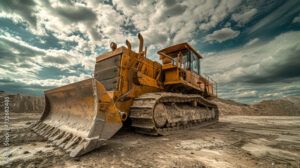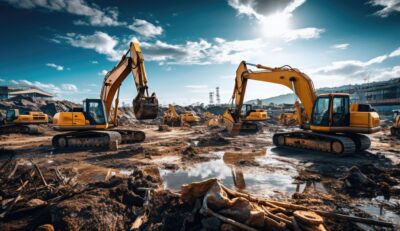Ever wondered how a flat, empty field turns into a fancy building? It all starts with getting the ground ready, and that’s where these giant machines called earthmovers come in. They’re the muscle behind every construction project, digging, pushing, and hauling dirt to make way for new things.
Explore how these earthmoving equipment are important in transforming raw land into a construction-ready canvas. Watch as they level the ground, dig foundations, and prepare the area for the construction crews to move in. Without these big machines, building projects cannot even start.
1. Bulldozers
Picture a construction site, and the image of a bulldozer likely comes to mind. These robust machines are the undisputed champions of earthmoving. Equipped with a wide, flat blade at the front, bulldozers excel in pushing large amounts of loose material, like soil, debris, and even small rocks. Their strength shines in tasks like:
- Site Clearing – Bulldozers efficiently clear vegetation, debris, and unwanted materials to prepare the construction area.
- Rough Grading – By pushing dirt piles, bulldozers can roughly level uneven terrain, creating a base for further grading.
- Material Spreading – They can spread stockpiled soil or gravel across the construction site.

2. Excavators
These versatile machines are the Swiss Army Knives of earthmoving equipment. With a rotating superstructure, a long arm, and a bucket attachment, excavators can dig, lift, load, and demolish with remarkable precision.
Excavators, similar to bulldozers, come in tracked and wheeled versions, with tracked models offering greater stability on difficult terrain. When selecting an excavator for your project, choose the leading excavator and equipment hire specialist, so they can provide you with the suitable equipment for the job.
Their ability to swap attachments makes them highly adaptable to diverse construction needs.
Their capabilities encompass a wide range of tasks:
- Excavation – From digging trenches for foundations and basements to creating ponds and pools, excavators handle various excavation needs.
- Demolition – Their powerful arms can demolish structures, break up concrete, and remove unwanted materials.
- Loading – Equipped with buckets of different sizes, excavators can efficiently load trucks with excavated materials.
- Fine Grading – Tiltrotator attachments on the excavator’s arms enable precise grading for building pads and landscaping.
3. Dump Trucks
Dump trucks are the unsung heroes of construction sites. They handle the task of hauling excavated materials away from the work area. Their sturdy frames and hydraulically operated beds enable them to transport large quantities of dirt, rocks, and debris efficiently.
Dump trucks are available in a wide range of sizes, with capacities spanning from just a few tons to massive haulers capable of carrying tens of tons of material. Selecting the right size depends on the volume of material that needs to be transported.
Here’s their role in the construction process:
- Material Hauling – Dump trucks carry excavated soil, demolished materials, and other loose materials from the construction site to designated disposal areas.
- Delivery of Materials -They can also deliver gravel, sand, and other necessary materials to the construction site.
4. Loaders
While excavators are masters of all trades, loaders specialize in loading and transporting loose materials. They feature a large bucket at the front, connected to a hinged arm that allows for scooping, lifting, and dumping materials into trucks or stockpiles.
Loaders are often wheeled for faster transportation around the job site. Some models come with high-lift attachments, enabling them to reach higher for loading purposes.
Common applications of loaders include:
- Truck Loading – Loaders efficiently fill dump trucks with excavated soil, gravel, or other loose materials.
- Material Handling – Loaders can move various materials around job sites, including sand, gravel, and debris from demolition work.
- Site Cleanup – Loaders are adept at clearing debris piles and leftover materials after construction stages.
5. Graders
The taskmasters of precision graders ensure a smooth, level surface for construction. They feature a long blade mounted on a chassis and additional attachments for shaping and compacting the ground.
Graders are purpose-built for achieving precise finishes and are crucial for projects requiring meticulous ground preparation. Here’s how graders contribute:
- Fine Grading – Once the initial rough grading is done, graders achieve a precise, level surface for building foundations, roads, and other structures.
- Sloping – They can create angled surfaces for drainage, ramps, or other design features.
- Subgrade Compaction – Certain grader models have attachments that compact the soil after grading, ensuring a solid base.
Conclusion
In summary, earthmoving equipment is essential for preparing land for construction projects. From bulldozers and excavators reshaping the terrain to dump trucks hauling materials, loaders moving them around, and graders precisely leveling surfaces—these machines make the building possible. Earthmovers transform empty fields into construction sites. Without these big machines working hard to prepare the ground, new cities and roads couldn’t be built.
Jessica Thompson
Jessica Thompson is an experienced construction writer and editor passionate about heavy machinery and infrastructure projects. With over a decade of experience in the industry, she has witnessed firsthand the power of earthmoving equipment in shaping our built environment. Jessica’s in-depth knowledge and engaging writing style bring these mighty machines to life, inspiring readers to appreciate the unsung heroes behind every construction endeavor.












